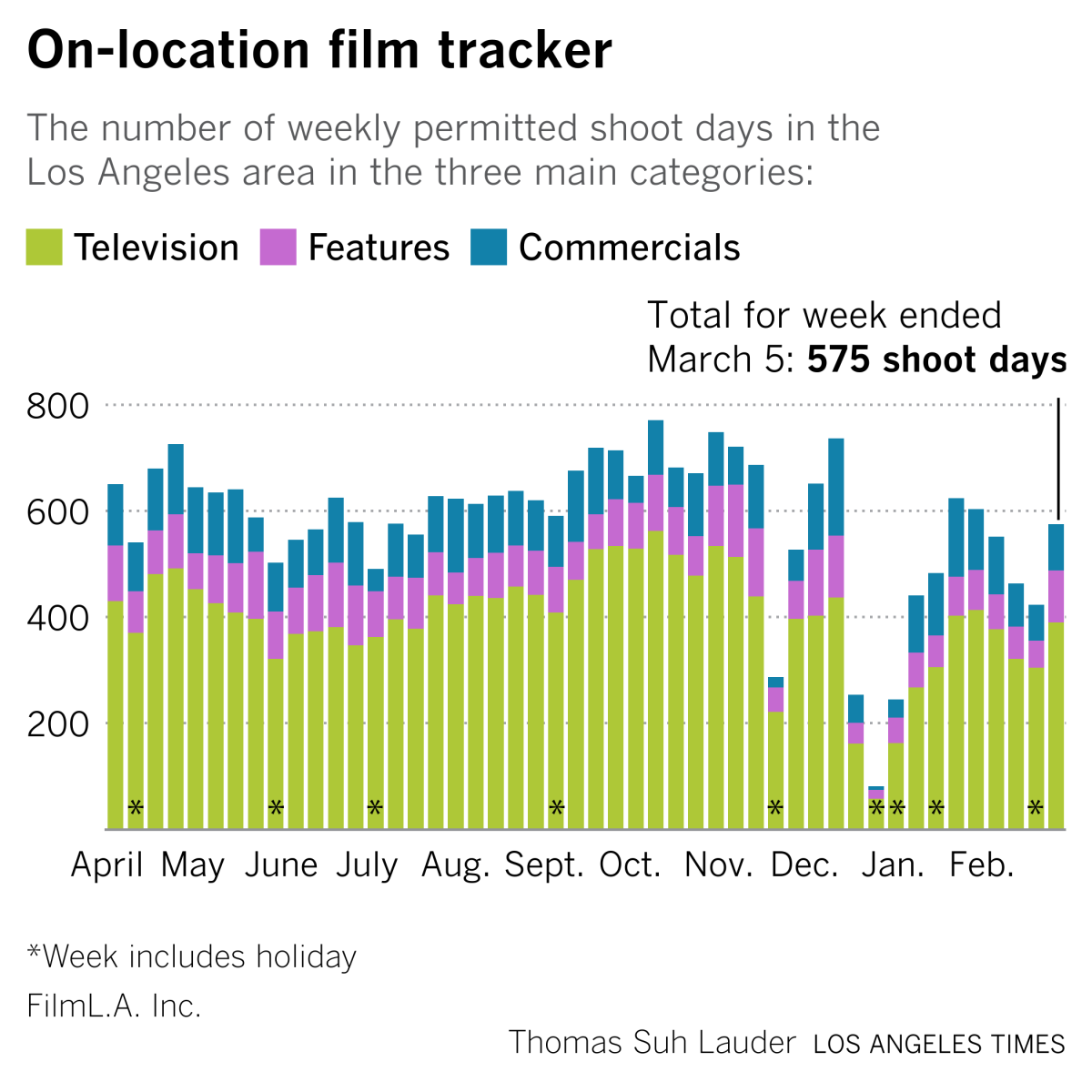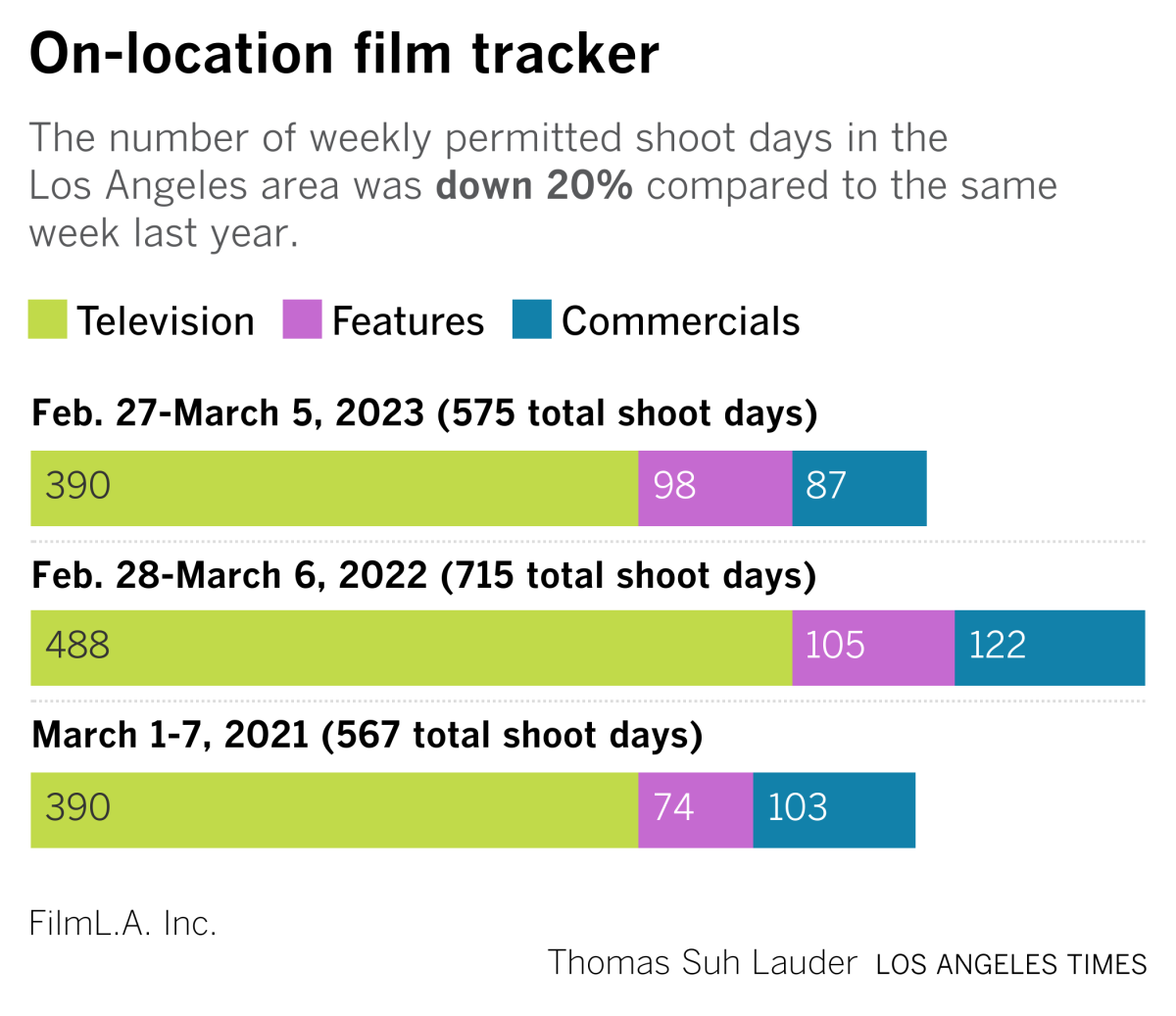Welcome to the Wide Shot, a newsletter about the business of entertainment. Sign up here to get it in your inbox.
“South Park” creators Trey Parker and Matt Stone have managed to get themselves back in the news again lately, mainly for the second episode of the show’s 26th season (“The Worldwide Privacy Tour”), a Canadianized lampooning of Prince Harry and Meghan Markle and the ongoing feud engulfing the world’s greatest geopolitical anachronism, the British royal family.
More relevant to this column, though (and, sadly, not to the advantage of our web traffic numbers), is a very different kind of beef — a major breach-of-contract lawsuit.
Warner Bros. Discovery sued Parker and Stone’s South Park Digital Studios, their longtime partner Paramount Global (formerly ViacomCBS) and the latter’s MTV Entertainment Studios unit for more than $200 million, alleging that the companies behind the long-running satirical cartoon violated a lucrative licensing agreement. Warner says this was done to prop up streaming service Paramount+ at the expense of Warner’s subscription video offering, HBO Max.
The 24-page complaint, filed in New York Supreme Court late last month, and the events leading up to it shine a spotlight on some of the strange dealings that resulted from Hollywood’s love affair with the streaming business, so it’s worth taking a look at the dispute here.
The case
In October 2019, WarnerMedia offered the winning bid for the much-sought-after streaming rights to the “South Park” library and new seasons through June 2025, agreeing to pay more than $500 million over five years. Quite a get for HBO Max — one the company prominently advertised — when the streaming wars were just getting started and the market for established shows was booming (resulting in hefty sums for “Friends” and “The Office”). The per-episode fee for “South Park” came out to $1.69 million, according to the suit.
“South Park,” which premieres new installments on Paramount’s Comedy Central, has amassed more than 300 episodes for its library since launching in 1997. It boasts strong appeal among younger viewers and continues to make headlines, as the Duke and Duchess of Sussex can attest.
In the fall of 2019, Viacom was focused on combining with its corporate cousin CBS at the wishes of Shari Redstone, and Paramount’s streaming strategy was a work-in-progress. Its service, Paramount+ (rebranded from CBS All Access), finally launched in March 2021 — 10 months after HBO Max. Because of the prior deal, Redstone and Paramount CEO Bob Bakish couldn’t use the “South Park” TV show to lure streaming subscribers. Instead, the firm made a pact with Parker and Stone to release 14 new hourlong TV movies for Paramount+ as part of a larger $900-million deal to continue the show on Comedy Central through 2027.
Warner and HBO say this was part of an “illicit scheme to unfairly and deceptively divert” new “South Park” material to Paramount+. They argue that HBO Max had the rights to stream all “South Park” episodes and that Paramount had an obligation to offer Warner/HBO other long-form (i.e., content longer than 20 minutes) straight-to-streaming content.
Also, according to Warner/HBO, the “South Park” company didn’t deliver what it said it would. Warner says the “South Park” team promised 10 episodes for each of the three most recent seasons — the 24th, 25th and in-progress 26th. However, citing the pandemic’s restrictions on production, the “South Park” studio instead produced two 50-minute specials for Season 24. The other two seasons comprise six episodes each.
If Warner/HBO was expecting 30 episodes from the new season, “South Park” came up 16 short, unless you accept Paramount’s contention that the two COVID-19 specials should count double.
A Paramount spokesperson said in a statement that Warner’s “claims are without merit” and that the company “continues to adhere to the parties’ contract by delivering new South Park episodes to HBO Max.” People close to the production of “South Park” say that the contract language did not specify a minimum number of episodes per season, but the defendants have yet to put that claim on the record in a statement or legal filing.
Neither company would provide a copy of the contract to The Times.
Paramount’s statement adds that the studios have continued to provide new “South Park” episodes to HBO Max “despite the fact that Warner Bros. Discovery has failed and refused to pay license fees that it owes to Paramount for episodes that have already been delivered, and which HBO Max continues to stream.” If Warner/HBO Max is withholding quarterly payments midway through a five-year deal, the media giant is certainly taking a hard-knuckled approach.
The state of Warner and Paramount
This fight comes at an interesting time for both Warner Bros. Discovery and Paramount Global.
The “South Park” specials aren’t the only example of a Paramount Global strategy meant to correct for a shortsighted deal made before the company formed its streaming plan.
Paramount managed to use the halo around “Yellowstone” creator Taylor Sheridan for Paramount+, despite having sold the rights to TV’s biggest scripted show to rival Peacock. Chris McCarthy, the head of MTV Entertainment Studios, Paramount Media Networks and (as of recently) Showtime, has been particularly adept at this kind of clever maneuvering, green-lighting Sheridan projects including “1883” and “1923” for the streamer.
At the same time, Warner Bros. Discovery has been going through its own radical transition under Chief Executive David Zaslav as it tries to pare down its debt. Executives now have an expanded bonus pool meant to encourage them to increase cash flow and reduce leverage, according to a Monday regulatory filing. The company is looking to get out of the business of regional sports networks, the Wall Street Journal reported, after a year of significant cost-cutting and rethinking of priorities.
Interestingly, the “South Park” dispute contains echoes of a lawsuit that production company and financier Village Roadshow filed against Warner Bros. last year.
The centerpiece of that complaint was “The Matrix Resurrections,” which Warner Bros. shifted from an exclusive theatrical release to a same-day streaming debut on HBO Max in its “Project Popcorn” pandemic plan under the studio’s previous owners. Village Roadshow, which co-funded the “Matrix” franchise and dozens of other Warner Bros. films, accused the studio of “deliberate and consistent coordinated efforts” to “eviscerate the significant value of Village Roadshow’s intellectual property in order to prop up” its sister streaming service HBO Max.
Warner Bros. shot back, saying Village Roadshow refused to pay the more than $100 million it had agreed to provide to finance the film. Nonetheless, Village Roadshow’s logo appeared in the opening credits and its executives received tickets to the premiere. In that sense, it sounds remarkably similar to the back-and-forth between Warner/HBO and the “South Park”/Paramount folks. A judge in May granted Warner Bros.’ request to move the battle, which Zaslav inherited, to arbitration.
Of course, Warner Bros. Discovery is hardly unique in its efforts to control costs and determine which businesses make sense in the modern entertainment business.
Paramount this year downsized Showtime and merged the “Billions” brand and studio with Paramount+ and MTV Entertainment Studios, resulting in 120 layoffs and some programming cancellations. The company is also exploring the sale of a majority stake in BET (with Tyler Perry and Byron Allen both interested in buying). Walt Disney Co. and Netflix have had staffing reductions too. Multiple networks and streamers have canceled shows.
All are struggling with the erosion of traditional TV, a rocky ad market and the challenges of the leap to streaming, and as company priorities shift, much dirt will get shaken out in the courts.
Stuff we wrote
— Michael Jackson biopic to spend a record $120 million in California under state tax credit program. The state has allocated $21.1 million in tax credits to Santa Monica-based studio Lionsgate for “Michael.”
— Murdoch has survived scandal after scandal. Will the Dominion-Fox News lawsuit be different? Media mogul Rupert Murdoch acknowledged that he could have stopped the parade of conspiracy theorists on Fox News from amplifying false claims by former President Trump and his surrogates that the election in 2020 was stolen.
— How strong is Dominion’s defamation case against Fox News? Legal experts weigh in. Lawyers believe Dominion has a powerful argument against Fox News. Evidence so far, including Murdoch’s deposition, is already giving the conservative network headaches. Further reading: Lorraine Ali writes that the case has revealed Fox News’ kryptonite: the bottom line.
— What did Disney actually lose from its Florida battle with DeSantis? The Florida governor has declared Walt Disney Co.’s “corporate kingdom” in Florida is over after the passage of legislation that allows him to take over the Reedy Creek Improvement District, in retaliation for the company’s condemnation of legislation that opponents have called “Don’t Say Gay.”
— Strike watch: WGA chief negotiator David Young was replaced due to illness ahead of key talks with studios. WGA asks members to vote on key demands in bargaining with studios. Directors Guild to begin contract talks with studios on May 10.
— ICYMI. ChatGPT who? Ari Emanuel lets his AI alter ego open Endeavor’s earnings call. From Chris Rock to the SAG Awards. Why Netflix is dabbling in livestreaming. Redstone saga book ‘Unscripted,’ reviewed. L.A. County agrees to $28.85-million settlement with Bryant family over crash photos. Paramount to pay $122.5 million to settle lawsuit over CBS deal.
Number of the week

A big win for first-time director Michael B. Jordan as MGM’s “Creed III” scores a franchise-best debut of $58.7 million domestically during its opening weekend, plus $41.8 million overseas for a global opening of $100 million. The audience was young and diverse, with 55% of ticket buyers in the 18-to-34 demo, and 77% were nonwhite, marking a remarkable evolution from the older, whiter “Rocky” era.
Best of the web
— You knew this was coming: Move over, ‘Cocaine Bear!’ ‘Sharknado’ producers to release ‘Attack of the Meth Gator’ this summer. (EW)
— Two sides of the HBO apocalypse. “The Last of Us” and “Station Eleven” are a natural point of comparison, but what separates the series is ultimately more instructive than what lumps them together. (The Ringer)
— More Paramount leaks: The company turned down a $3-billion-plus offer for Showtime from former executive David Nevins. (WSJ)
— Underrated point about the state of the film business: Bad projection is ruining the theatrical experience. (Vulture)
— HQ Trivia gets the rise-and-fall documentary treatment. (Daily Beast)
— Surprise, surprise. Lawmakers struggle to keep up with the A.I. boom. (New York Times)
Films shoots
Los Angeles production was up week-to-week but was still down 20% from the year-ago week, according to FilmLA data.


Finally …
Looks like “Everything Everywhere All at Once” is going to win best picture on Sunday. But it’s the Academy Awards, so who knows? If you’re looking for a great read that is not about the Oscars, check out this story about five friends skiing the tallest mountain in Los Angeles.
Stay connected with us on social media platform for instant update click here to join our Twitter, & Facebook
We are now on Telegram. Click here to join our channel (@TechiUpdate) and stay updated with the latest Technology headlines.
For all the latest Business News Click Here
